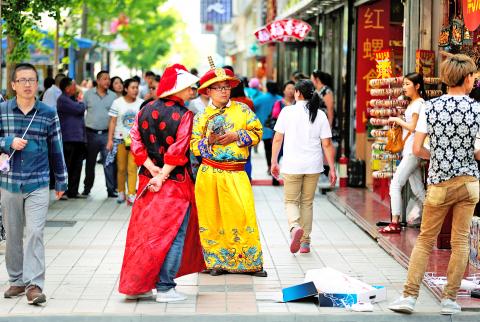China’s exports unexpectedly fell 6.4 percent last month from a year earlier, while imports tumbled by a deeper-than-forecast 16.2 percent, fueling expectations that Beijing would quickly roll out more stimulus to avert a sharper economic slowdown.
The dismal trade performance raises the risk that second-quarter economic growth may dip below 7 percent for the first time since the depths of the global financial crisis, adding to official fears of job losses and growing levels of bad debt.
“This is bad. I expect an interest rate cut this weekend,” economist Tim Condon at ING in Singapore said.

Photo: AP
“This is going to make 7 percent [GDP] growth hard to attain. It looks like the weakness in the first quarter wasn’t transitory. It’s persistent,” Condon said.
The People’s Bank of China has lowered interest rates and banks’ reserve requirement ratio (RRR) thrice in three months since November last year to stoke the economy, and most analysts had expected it to loosen policy again on both fronts in coming months.
Policy insiders told Reuters this week that China’s leaders have been caught off guard by the sharpness of the downturn, and are likely to resort to fiscal stimulus to revive growth after a flurry of monetary policy easing has proved less effective than hoped.
Imports have been weaker than exports, falling 16.2 percent last year from a year earlier, according to data released by China’s General Administration of Customs yesterday, highlighting tepid domestic demand as the world’s second-largest economy slows.
Analysts polled by Reuters had expected exports to rise 2.4 percent last month after a 15 percent plunge in March, and predicted imports would fall 12 percent after a 12.7 percent drop the previous month.
Economists at Nomura expect annual economic growth to slow to 6.6 percent in the second quarter from 7 percent in the first quarter, and are pencilling in three more 25-basis-point rate cuts and two more 50bps cuts in banks’ reserve requirements for the rest of the year, which would mark the central bank’s most aggressive easing campaign since the global crisis.
Buffeted by lukewarm foreign and domestic demand, China’s trade sector has wobbled in the past year, adding to pressure on the slowing economy and unsettling policymakers.
Earlier this week, China’s trade minister said the devaluation of currencies by some countries has led to sharp gains in the yuan, hurting the competitiveness of Chinese exports.
The yuan has gained against major non-dollar currencies in recent months, leading to its rise on a trade-weight basis. However, Chinese Premier Li Keqiang (李克強) has ruled out a devaluation, even as the economy faces headwinds.
While some exporters said they have not felt the impact of a rising yuan, thanks in part to the growing popularity of currency hedging options, few doubt that sales would suffer in coming months if the yuan sustains its ascent.

SEEKING CLARITY: Washington should not adopt measures that create uncertainties for ‘existing semiconductor investments,’ TSMC said referring to its US$165 billion in the US Taiwan Semiconductor Manufacturing Co (TSMC, 台積電) told the US that any future tariffs on Taiwanese semiconductors could reduce demand for chips and derail its pledge to increase its investment in Arizona. “New import restrictions could jeopardize current US leadership in the competitive technology industry and create uncertainties for many committed semiconductor capital projects in the US, including TSMC Arizona’s significant investment plan in Phoenix,” the chipmaker wrote in a letter to the US Department of Commerce. TSMC issued the warning in response to a solicitation for comments by the department on a possible tariff on semiconductor imports by US President Donald Trump’s

‘FAILED EXPORT CONTROLS’: Jensen Huang said that Washington should maximize the speed of AI diffusion, because not doing so would give competitors an advantage Nvidia Corp cofounder and chief executive officer Jensen Huang (黃仁勳) yesterday criticized the US government’s restrictions on exports of artificial intelligence (AI) chips to China, saying that the policy was a failure and would only spur China to accelerate AI development. The export controls gave China the spirit, motivation and government support to accelerate AI development, Huang told reporters at the Computex trade show in Taipei. The competition in China is already intense, given its strong software capabilities, extensive technology ecosystems and work efficiency, he said. “All in all, the export controls were a failure. The facts would suggest it,” he said. “The US

The government has launched a three-pronged strategy to attract local and international talent, aiming to position Taiwan as a new global hub following Nvidia Corp’s announcement that it has chosen Taipei as the site of its Taiwan headquarters. Nvidia cofounder and CEO Jensen Huang (黃仁勳) on Monday last week announced during his keynote speech at the Computex trade show in Taipei that the Nvidia Constellation, the company’s planned Taiwan headquarters, would be located in the Beitou-Shilin Technology Park (北投士林科技園區) in Taipei. Huang’s decision to establish a base in Taiwan is “primarily due to Taiwan’s talent pool and its strength in the semiconductor

French President Emmanuel Macron has expressed gratitude to Hon Hai Precision Industry Co (鴻海精密) for its plan to invest approximately 250 million euros (US$278 million) in a joint venture in France focused on the semiconductor and space industries. On his official X account on Tuesday, Macron thanked Hon Hai, also known globally as Foxconn Technology Group (富士康科技集團), for its investment projects announced at Choose France, a flagship economic summit held on Monday to attract foreign investment. In the post, Macron included a GIF displaying the national flag of the Republic of China (Taiwan), as he did for other foreign investors, including China-based